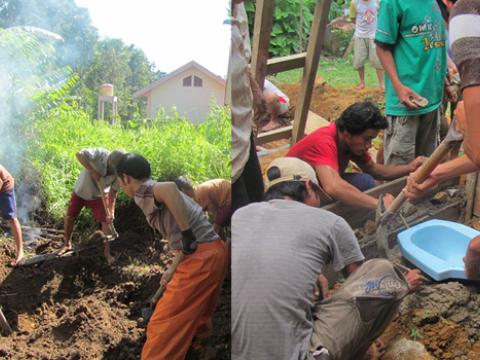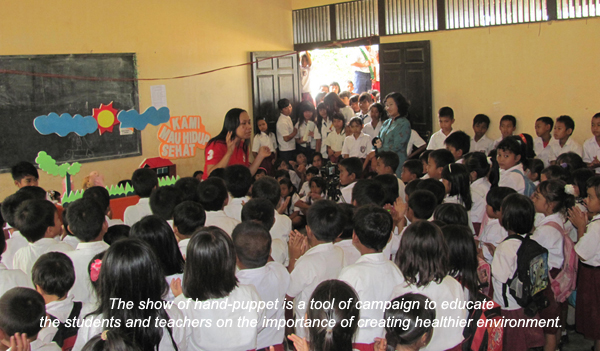Lubuk Tajau Ponders Healthier Sanitation

Toilets are still a rarity in Lubuk Tajau village. More than 90 percent of all the 417 families living in the village still have no toilets at their houses. They frequented the open spaces in their surroundings to defecate.
The situation in Lubuk Tajau is a reflection of the real condition in many other villages across West Kalimantan and in other provinces in Indonesia. The Central Statistics Board mentioned in its recent reports that some 100 million Indonesian people still have no access to healthy sanitation facilities. Out of the number, 65 millions are still defecating near their houses, such as in the bushes, rivers, ponds, and along the seashore.
In an effort to improve the sanitation problems, the Wahana Visi Indonesia office in Sekadau has given top priority to this development sector. Wahana Visi has facilitated a series of meeting with the representatives from the villages and relevant government officials to discuss the sanitation issues. One of the participants is Lukas, 41, the leader of the Beringin Jaya Mandiri farmers' group from the Kinore hamlet in Lubuk Tajau.
 Lukas is among those who did not have a toilet and did not understand why it was important. But, after joining the discussions, the father of five children finally understood about the importance of sanitation facilities.
Lukas is among those who did not have a toilet and did not understand why it was important. But, after joining the discussions, the father of five children finally understood about the importance of sanitation facilities.
"Now I know why defecating anywhere we like near our houses could endanger our health, especially for our children who are very prone to disease," he said. Lukas has actively talked with his neighbors about taking the initiative to stop their unhealthy habits. He has also initiated discussions with his neighbors and local authorities on the needs to jointly work to build more toilets in the village.
The sanitation problem in Lubuk Tajau was also caused by the still lack of commitment from local government officials on the issue.
Wahana Visi officers in Sekadau decided to collaborate with local officials on programs that would improve sanitation in the villages. The cooperation has been nurtured with the Sekadau Development Planning Agency, Health Office, Environment Office and officers at the Sekadau Hilir and Nanga Taman sub-districts. The main target of the cooperation is to map out policies that will improve the sanitation infrastructure in the villages for better community health.
Wahana Visi has also launched campaigns through local schools to educate the students and teachers on the importance of creating a healthier environment. To make the campaigns more attractive, a group of hand-puppet shows have also joined the campaign. The puppet show carries two themes: Stop defecating in the open spaces and Let's wash our hands with soap.
The hand-puppet shows have been conducted in scores of schools in Sekadau Hilir and Nanga Taman sub-districts. Wahana Visi, in special partnership with World Vision, began working in Sekadau in October 2011.
*Edited and Translated by Hendro Suwito, Senior Editor, World Vision Indonesia
